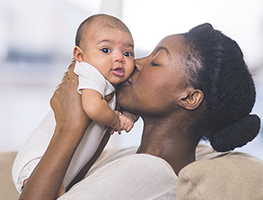Understanding your role as a birth partner
If you are the partner of someone who is pregnant or you have been asked to be a birth support person, you have been given a privilege and a responsibility: to provide emotional and physical support to a woman who will need your help through one of the most significant and vulnerable experiences of her life.
Being the support person for a woman in labour is a wonderful experience, a great honour, and a particularly personal journey if you are the father of her baby. “You walk into that birthing suite with a pregnant wife and you walk out a Dad,” one husband explained.
Being a birth support person is also pretty scary – especially if you have never done this before.
Many prospective birth support people report that they worry they won’t know what to do, that they will be completely useless, that they will panic or faint, that they will be horrified and say or do something inappropriate.
Sometimes they worry about things going wrong and about the health of their partner and the baby. These are all very common fears and it’s often really helpful if you can come out and say (or maybe write down) what you’re most worried about.
It’s okay to be anxious. And a great way to combat this is to gather as much information as you can about what is going to happen, so that you can help as best you can.
The best person to ask, of course, is the pregnant mother. She probably has certain expectations of what your role will be; ask her to explain them to you if you feel unsure. A few minutes of conversation can clear up lots of uncertainty.
Getting ready for the birth
Ideally, you will attend ante-natal classes together, where you will be able to get involved in demonstrations of different techniques to help cope with the waves of contractions in labour.
If you are able, try to go along to a few ante-natal visits to meet her healthcare provider, have a bit of a look around (and maybe a tour) at the hospital. You are going to spend some time there so it’s good to check out the café, meet the nurses or midwives, and perhaps ask a few questions about what they think makes a good support person.
If it’s to be a homebirth, you might need to go and pick up supplies or set up a birthing pool; you might even want to do a practice emergency run to the nearest hospital, just in case. Make sure you are well prepared.
Many birth partners (dads in particular) report that they sometimes feel frustrated and a bit helpless, particularly in early labour, as they are not accustomed to being a bystander. It’s important to realise up-front that being a birth support person means letting go of all control.
You cannot have the baby, you cannot go through the contractions, and you cannot take the pain away. You are there to be encouraging and supportive and nurturing, and act as her greatest cheer-leader, your moral support will be an enormous help to the labouring woman.
Another husband likened the requirements of a birth support person in the earlier stages of labour to being on the bench at the Super 12 Final - all he could do was cheer and pass the water bottle.
The birth plan
Many pregnant women will write down a birth plan that will clearly set out her expectations and the decisions she has made about the birth. If your partner does not have a written plan, make sure that you take time to sit her down and talk about some of the decisions she has made.
She is bound to have lots of fears, wants, emotions and expectations about childbirth. It’s important that you listen carefully and keep an open mind. This is her birth and as a birth support person, your role is to support her decisions and encourage and nurture her, not to judge or criticise.
It’s important to understand what role she wants you to play – and a lot of that will come from her own intentions about the birth, how actively she expects you to participate in decision making and learn techniques to manage pain and in delivering the baby. Be guided by her preferences about whether she wants a more natural birth or a more medical birth.
In a natural birth, she will rely on herself and her birth support person more heavily to get through the stress and pain, to advance her labour and to deliver her baby.
A more medical birth will see her relying more heavily on her doctor and midwife to make decisions, introduce drugs or procedures to manage pain, and assist in the labour’s progress and the baby’s delivery.
Either choice – or anything in between – is equally valid and needs to be supported. During the height of labour, she will usually not be able to speak or communicate much through contractions and may rely on you to convey her decisions to her healthcare providers, so it’s reallyimportant that you understand what she wants.
Who will be at the birth?
Birth is an incredibly private and intimate experience. It is strongly impacted by the psychological state of the mother; and it’s really important that the labouring woman feels completely comfortable with the people who are in the room with her.
If you have volunteered to be a birth support person, make sure that the mother is not just being polite and that she is truly going to feel at ease with your presence. If she is uncomfortable with you being there, it is likely to slow down her labour and have a really negative effect on the birth.
Mothers, sisters and mothers-in-law frequently assume that they will be a great help in a birth, when actually the labouring mother would be far more relaxed without them there. Give her the opportunity to honestly express her thoughts about who she wants there. Don’t bully her, load her with guilt or try to convince her otherwise. This is not about you. This is also not the time or place for a party, a social occasion or a family reunion.
If you are one of the trusted support people, it’s important that you have a good idea about who else the labouring woman wants in the room – and be prepared to act as gatekeeper for her.
Dads have an important role in managing their own family’s involvement in the birth as it can be difficult for pregnant women to set boundaries for their in-laws, fearing family conflict.
What does a birth support person do?
Labour has distinct stages and there will be different requirements of you in each stage.
All women (and all labours) are different, so your role might be just to be there having a chat in the quiet early stages; later, you might have a physically demanding role, holding her upright during painful contractions; you might need to help with showers, massages, getting drinks and ice – or she may want you just to be there, quietly holding her hand.
She will tell you what she needs. If you’re not sure – ask, but don’t hound her. Be guided by her mood and fit in with her. Don’t be hurt or offended if she says or does something that is out of character or if she is sharp or aggressive with you – this is usually because she is in pain and probably exhausted.
Some women want their partner to stand by quietly through each contraction and don’t want to be touched at all; other women will find comfort from you stroking her hair or massaging her back.
Some women need constant encouragement and want to hear your voice, while others prefer to labour in silence. Eye contact and quiet approval may be all that she needs.
Your biggest role is to provide emotional support, positive encouragement and praise. You will be her guide, reminding her of how far she has come, how well she is doing, how proud you are of her; it’s important that you avoid any criticism or negativity.
Although you may feel anxious, particularly when she is in obvious pain, it’s best to keep your own anxiety about the pain she is experiencing to yourself, lest you discourage her.
If you are feeling panicky, call on another support person or perhaps the midwife, to stay with her and take a few minutes’ break. Never leave her alone for more than a minute, but most midwives will understand if you need to take 10 minutes out to get some fresh air and pull yourself together, and will step in for a while to cover for you.
What to expect during the early stages of labour
In early labour, contractions are just beginning and may be anything from 30 minutes to 5 minutes apart. This is mostly a waiting game – and you are there as an encouraging friend, keeping her company before the big marathon.
Many women choose to labour at home. As a support person, your role is to encourage her to rest if possible for at least some of the time, provide some distraction and – if she is ready – some “labour enhancing” activities.
In early labour, it’s best to alternate between rest (to prepare for the long work ahead) and activity (being upright will speed things up, which makes the whole process shorter. )Perhaps you can walk around with her, climb a few sets of stairs or even do a spot of hula dancing if she feels so inclined.
In this period, as the birth partner you need to also keep her focused on eating, maintaining fluids and emptying her bladder at least once an hour. It’s best to eat easily-digested carbohydrates – like bananas, non-fat yoghurt, eggs, toast, plain biscuits, noodles or rice. Water is best to drink, so avoid sweet or acidic drinks.
Try not to put too much pressure on by obsessively timing each contraction and watching the clock, this can actually slow things down.
Distractions can include light entertainment – do a trivia quiz or crossword together; maybe watch a DVD (something you can stop during contractions is good); laughter helps you to relax and floods the body with good, labour-enhancing hormones, so comedies can be very helpful.
What to expect during the active labour stage
The active labour stage is where your role becomes really important. Contractions come 3 to 5 minutes apart, and are becoming intense and painful. This period often lasts for many hours.
This is where the ante-natal classes come into play. Keep the woman focused on her breathing and breathe with her through the contraction.
You’ve still got the important task of reminding her to have small sips of water after each contraction and relieving her bladder at least every hour.
You’re also there to help with pain-managing techniques. If you are unsure, be guided by the midwife, who will be able to help you offer support. Try to establish rituals. The same technique will often work for a few contractions in a row, so go with that for as long as it works; but then she may feel that she needs to switch to a new ritual.
Many labouring women feel inhibited about making noise, but it will often help, so encourage her not to feel embarrassed.
In a long, tiring labour, you will both need a bit of a rest between contractions. Many women report that encouragement worked well, along with reminders that a particularly long and painful contraction was probably opening up the cervix really well.
“That was great; well done; you handled that really well. ” “That was a strong one; that’s probably opening things up really well. ” “Your baby is coming soon, you are doing such a great job. ” That kind of thing.
As contractions come closer together and last longer, you will spend the time between each contraction resting and getting her prepared for the next.
Did the last contraction work well? Does she want to stay in that position?
Watch her face so that you can get an idea of what she might need. Perhaps her lips are dry, or she may need a sip of water. Intense labour can be hard work and it’s important to keep hydrated with frequent sips of fluid; water is best, avoid citrus, sweet or acidy drinks as they can cause nausea.
If she is holding her breath, you may want to give a gentle reminder to breathe deeply and keep focusing on breathing.
She will be relying on you to provide reassurance, minimise distractions and keep a calm, tranquil environment around her.
What to expect during the transition stage
At the end of Active Labour, the woman will move into the transition stage – the most intense and demanding part of labour. It’s common to be discouraged, scared or angry at this stage. Don’t take it personally!
Remind her that this is a great sign, she’s probably in transition and her baby will be here soon.
After a difficult or panicky contraction, try to settle her down by preparing her positively for the next one.
She may become despairing and feel that she cannot continue. She will need your reassurance, confidence and optimism. Stay close, hold her and help her regain her spirits. She will need you to be strong and calm, loving and encouraging. Try helping her to breathe through the next contraction, breathe with her, and remain calm. Tell her she’s doing well. Call on the midwife or other medical professionals whenever you feel uncertain or concerned.
What happens if a medical procedure is required during the labour or birth?
It is impossible to predict the course of any woman’s labour and no matter how determined or prepared she may be for a natural birth, sometimes this can’t happen.
Some women go into birth with the expectation and desire for medical assistance wherever possible.
As her birth partner, you are often the liaison between the birthing woman and the medical professionals in the hospital. She will be looking to you to help her to make decisions about things she may not have considered or expected.
Your role is to make sure she understands the options available to her – and to let her make her own choice, then support her in her decision.
Your support role during the birth
The second stage of labour is birth, typically lasting about an hour (though it can be anything from 5 minutes to three hours).
The midwife or obstetrician will usually guide you through this stage.
The role of the birth support person is usually to help support her in the positions she feels most comfortable, reinforce the suggestions of midwives and doctors and give lots of encouragement and reassurance.
You may also be on hand to catch the baby when it arrives, to cut the cord and to continue to support the mother through the first hours of the baby’s life.
Delivery of the placenta
After the birth, she will need to deliver the placenta and may then need medical attention, such as stitches or other assistance.
Many women are surprised when they have been so active and physical throughout the birth, to find that when the baby arrives, they are exhausted, weak and can barely stand.
Encourage the woman to stay rested and hold her new baby. After all, that’s what the whole process was about.
























